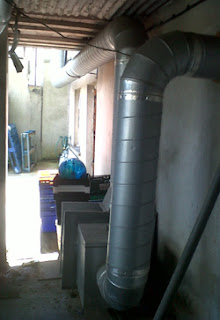Why Now is a Good
Time to set up a Kitchen Duct Cleaning Programme
After a serious fire,
how long does it take for a commercial kitchen to recover? 1 month? 6 months?
No-one can really tell, but what is certain, is that it will have an impact on
business long after it is dealt with - higher insurance payments, cost of
refurbishment and loss of customer confidence.
In cases where cooking
is the core activity of a business, such as in a restaurant, a kitchen fire
will have an immediate and severe impact. In businesses, such as pubs or clubs,
where cooking is an integral, but not central, part of the business, a kitchen
fire can easily spread, impacting on the more important areas.
During many cooking
operations, hot oils evaporate. The grease fumes condense on plenums, kitchen
extractor fans and inside extractor system ducts. Not only do these pose a
health hazard by harbouring bacteria and attracting insects and other pests,
they are a fire hazard unless they are cleaned thoroughly.
Cooking oils are
designed for use at about 200oC. When thermostat failure or human
error occurs, oils can be inadvertently heated above their flashpoint and are
easily ignited, creating a kitchen fire. Old and frequently used oils ignite at
lower temperatures so kitchen operators trying to save money by using cooking
oils for as long as possible are exposing their staff and business to an
increased risk.
According to Richard
Norman of the Building Engineering Services Association (Ref: Modern Building
Services Magazine July 2014 issue), grease build up in extractor systems is
a major hazard in commercial kitchens. He says that in ninety percent of
instances of a kitchen fire, a subsequent grease fire in ducting has spread the
fire more widely through the building. It is therefore imperative to carry out
regular kitchen duct cleaning and kitchen extractor fan cleaning. This reduces
the fire risk and increases kitchen hygiene too.
Many insurers demand
that duct cleaning is carried out in accordance with the Building Engineering
Services Association (BESA) recommendations. A few insurers require a greater
than recommended frequency of cleaning in order that a fire policy is valid so
make sure that you have read your policy very carefully. Heavy use kitchens
should have specialist duct cleaning at least once every quarter whilst light
use kitchen ducts and extraction systems should be cleaned at least once per
year.
The BESA
recommendations are set out in publication TR/19. This is entitled 'Guide to
Good Practice - Internal Cleanliness of Ventilation Systems'. The second
(and most recent) edition of TR/19 includes reference to the British and
European Standard BS EN 15780 concerning the cleanliness of ventilation
systems. This does not include kitchen extractor systems, nevertheless, BESA
made changes to highlight the current best practice to minimise the risk of a
grease fire in a kitchen duct.
It is section 7 that
concerns commercial kitchens. The last round of changes to section 7 concern
the frequency of cleaning. A new table has been drawn up showing how often
kitchen duct cleaning should take place. Each kitchen has a unique set of
circumstances. The new table approaches that issue by publishing figures based
on cooking type and hours of cooking.
Certification
When hiring a
commercial kitchen cleaning firm, always check beforehand that they will issue
a valid certificate of duct cleaning as this is also a requirement of many
insurance policies.
Responsibility
Commercial kitchen
cleaning is a highly-specialised area requiring both expertise and an in-depth
knowledge of both hygiene and fire regulations. Employing a non-specialist
contractor could lead to a heavy fine for the owner or manager of the kitchen.
How come?
The Fire Safety Order
of 2005 stipulates that the 'responsible person' must ensure that both
the facilities and equipment are subjected to a suitable system of maintenance.
All must be in good working order and repair. If it is shown that the fire was started
or caused by negligence such as poor cleaning of a kitchen duct, then there
will be at least a heavy fine. If anyone is killed in such a situation, they
face prison.
Beware of commercial
cleaning companies and individuals who undercut specialist businesses ... they
are cheap for a reason! Make sure that you hire the best - call APT
today on 0800 0723 773 for a free quote or advice without obligation. We
have been at the forefront of the industry, offering one-off deep cleans and
regular maintenance cleaning contracts for over 25 years. Our technicians are
fully trained and qualified to carry out duct, plenum and extractor fan
cleaning.


















